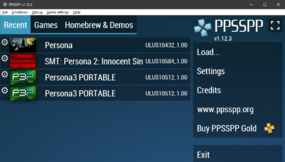PPSSPP

| |

| |
| PPSSPP 1.12.3 on the Recent section, with three games on it. | |
| Developer(s) | Henrik "hrydgard" Rydgård, uknownbrackets, raven02, xsacha, thedax |
|---|---|
| Latest version | 1.17.1 [+] |
| Active | Yes |
| Platform(s) | Windows macOS Linux Android iOS Switch Pandora Pyra Blackberry Symbian MeeGo Xbox One Xbox 360 Wii U |
| Emulates | PlayStation Portable |
| Website | PPSSPP.org |
| Programmed in | C++, C |
| License | GNU GPLv2+ |
| Source code | GitHub |
| BIOS/Keys | Optional |
PPSSPP (an acronym for PlayStation Portable Simulator Suitable for Playing Portably) is a multi-platform, open-source PlayStation Portable emulator written in C++ with the aim of speed and portability. Its development is ongoing and is still in a beta state, but progress is fast and most games are already playable. It is also available as a libretro core for RetroArch.
Contents
Download[edit]
|
Official Stable builds | |
| Official Dev builds | ||
| Play Store | ||
| Apple App Store[1] | ||
| 1.10.3 | ||
| 0.1 | ||
| Xbox One | ||
| 0.91 Alpha | ||
| Alpha | ||
Review[edit]
Since its release in 2012, the emulator is currently capable of playing 2599 games perfectly, 553 playable, 257 ingame, 132 menu-intro, and 203 unbootable.[2]. It is very active and gets updated frequently. It's also significantly faster than JPCSP due to it being coded in C++ instead of Java. Likewise, it is worth noting that not all these games can be played on mobile devices. These devices, especially older ones, often have very poor OpenGL ES drivers, although the situation is improving[3].
System requirements[edit]
- Main article: Computer_specifications#Recommended_Specifications
Common problems and fixes[edit]
- Weird text?
- Download the original fonts and place them into the /flash0/ folder, confirming overwrites; this may correct corrupted text in games that use the system font, such as punctuation replaced by overscores in Dissidia 012 Final Fantasy.
- Disabling buffered rendering fixed the no text issue with Final Fantasy IV for some. The forums say this will only fix it on Nvidia cards.
- DLC works without any plugins. For most games, dropping the files in memstick\PSP\GAME inside folders named with the code of the game (for example, PSP\GAME\ULUS10566 for the US version of Dissidia 012 Final Fantasy).
- X doesn't work? Turn on/off Buffered Rendering or MipMapping and try again.
- Too slow? Turn on/off Hardware Transform and try again.
- Danganronpa: Make sure you're using the latest dev build of PPSSPP and that Buffered Rendering, Read Framebuffers to Memory and FramebufferCPUConvert are enabled (FramebufferCPUConvert is only necessary on AMD I think, I don't need it on Intel/Nvidia and other Intel/Nvidia users seem to be the same).
- Having problems on the libretro port? Try the standalone versions; the libretro port receives updates, but they tend to be behind the standalone version.
External links[edit]
- Official PPSSPP forums
- Compatibility list
- Community Compatibility list
- PPSSPP Adhoc Support
- AMA on /r/pcgaming